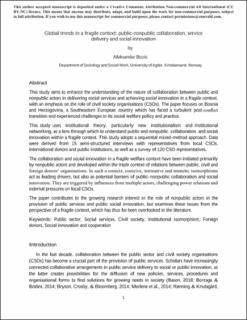| dc.contributor.author | Bozic, Aleksandar | |
| dc.date.accessioned | 2020-12-15T09:16:31Z | |
| dc.date.available | 2020-12-15T09:16:31Z | |
| dc.date.created | 2020-11-06T10:44:35Z | |
| dc.date.issued | 2020 | |
| dc.identifier.citation | Bozic, A. (2020). Global trends in a fragile context: public–nonpublic collaboration, service delivery and social innovation. Social Enterprise Journal, 17(2), 260-279. | en_US |
| dc.identifier.issn | 1750-8614 | |
| dc.identifier.uri | https://hdl.handle.net/11250/2719443 | |
| dc.description | Author's accepted manuscript. | en_US |
| dc.description | This author accepted manuscript is deposited under a Creative Commons Attribution Non-commercial 4.0 International (CC BY-NC) licence. This means that anyone may distribute, adapt, and build upon the work for non-commercial purposes, subject to full attribution. If you wish to use this manuscript for commercial purposes, please contact permissions@emerald.com. | |
| dc.description.abstract | This study aims to enhance the understanding of the nature of collaboration between public and nonpublic actors in delivering social services and achieving social innovation in a fragile context, with an emphasis on the role of civil society organisations (CSOs). The paper focuses on Bosnia and Herzegovina (BiH), a Southeastern European country which has faced a turbulent post-conflict transition and experienced challenges in its social welfare policy and practice. This study utilises institutional theory, particularly new institutionalism and institutional networking, as a lens through which to understand public and nonpublic collaboration and social innovation within a fragile context. This study adopts a sequential mixed-method approach. Data were derived from 15 semi-structured interviews with representatives from local CSOs, international donors and public institutions, as well as a survey of 120 CSO representatives. The collaboration and social innovation in a fragile welfare context have been initiated primarily by nonpublic actors and developed within the triple context of relations between public, civil and foreign donors’ organisations. In such a context, coercive, normative and mimetic isomorphisms acting as leading drivers, but also as potential barriers of public-nonpublic collaboration and social innovation. They are triggered by influences from multiple actors, challenging power relations and external pressures on local CSOs. The paper contributes to the growing research interest in the role of nonpublic actors in the provision of public services and public social innovation, but examines these issues from the perspective of a fragile context, which has thus far been overlooked in the literature. | en_US |
| dc.language.iso | eng | en_US |
| dc.publisher | Emerald | en_US |
| dc.rights | Navngivelse-Ikkekommersiell 4.0 Internasjonal | * |
| dc.rights.uri | http://creativecommons.org/licenses/by-nc/4.0/deed.no | * |
| dc.subject | Social services | en_US |
| dc.subject | Collaboration | en_US |
| dc.subject | Civil Society Organizations | en_US |
| dc.subject | Local welfare networks | en_US |
| dc.subject | Post-conflict reconstruction | en_US |
| dc.subject | Innovation in the public sector | en_US |
| dc.subject | Development cooperation | en_US |
| dc.subject | Innovation | en_US |
| dc.title | Global trends in a fragile context : public–nonpublic collaboration, service delivery and social innovation | en_US |
| dc.type | Journal article | en_US |
| dc.type | Peer reviewed | en_US |
| dc.description.version | acceptedVersion | en_US |
| dc.subject.nsi | VDP::Sosiologi: 220 | en_US |
| dc.subject.nsi | VDP::Sociology: 220 | en_US |
| dc.source.pagenumber | 260-279 | en_US |
| dc.source.volume | 17 | |
| dc.source.journal | Social Enterprise Journal | en_US |
| dc.source.issue | 2 | |
| dc.identifier.doi | 10.1108/SEJ-12-2019-0100 | |
| dc.identifier.cristin | 1845537 | |
| cristin.qualitycode | 1 | |

